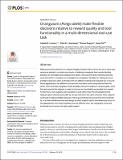Orangutans (Pongo abelii) make flexible decisions relative to reward quality and tool functionality in a multi-dimensional tool-use task
Abstract
Making economic decisions in a natural foraging situation that involves the use of tools, may require an animal to consider more levels of relational complexity than merely deciding between an immediate and a delayed food option. We used the same method previously used with Goffin´s cockatoos to investigate the orangutans’ flexibility for making the most profitable decisions when confronted with five different settings that included one or two different apparatuses, two different tools and two food items (one more preferred than the other). We found that orangutans made profitable decisions relative to reward quality, when the task required the subjects to select a tool over an immediately accessible food reward. Furthermore, most subjects were sensitive to work-effort when the immediate and the delayed option (directly accessible by using a tool) led to the same outcome. Most subjects continued to make profitable decisions that required taking into account the tool functionality. In a final multidimensional task design in which subjects had to simultaneously focus on two apparatuses, two reward qualities and two different tools, the orangutans chose the functional tool to access the high quality reward.
Citation
Laumer , I B , Auersperg , A M I , Bugnyar , T & Call , J 2019 , ' Orangutans ( Pongo abelii ) make flexible decisions relative to reward quality and tool functionality in a multi-dimensional tool-use task ' , PLoS ONE , vol. 14 , no. 2 . https://doi.org/10.1371/journal.pone.0211031
Publication
PLoS ONE
Status
Peer reviewed
ISSN
1932-6203Type
Journal article
Description
This work was supported by the University of St Andrews and the Max Planck Institute for Evolutionary Anthropology. Isabelle Laumer was supported by a uni:docs fellowship of the University of Vienna, Alice Auersperg was supported by by FWF grants J 3404-B19 and P 29084, and Thomas Bugnyar by Y366-B17.Collections
Items in the St Andrews Research Repository are protected by copyright, with all rights reserved, unless otherwise indicated.

